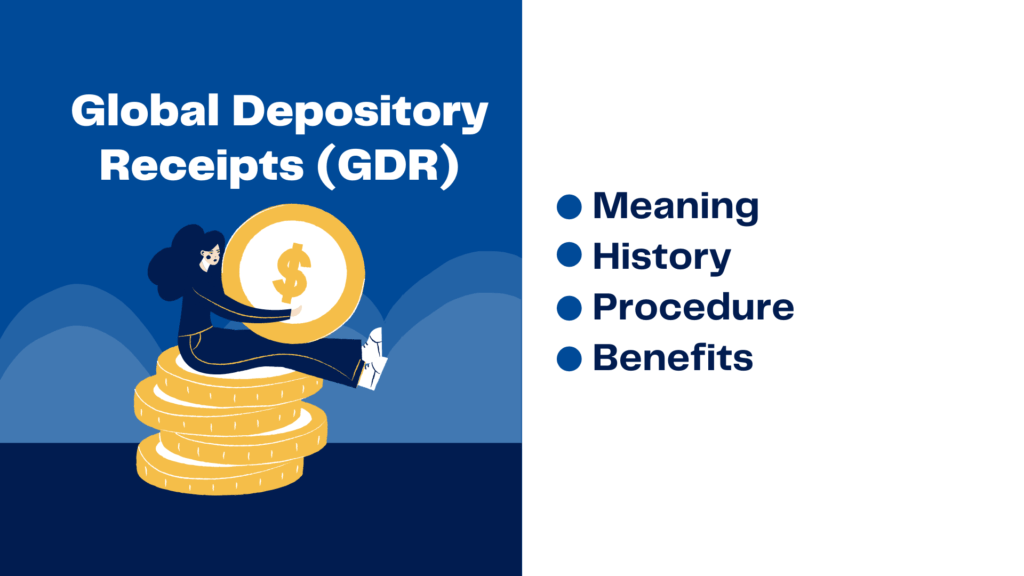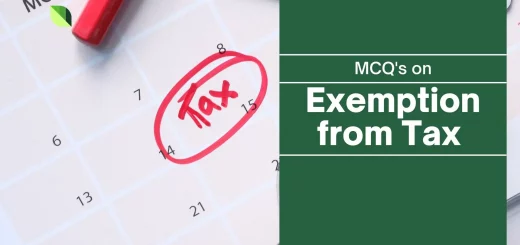GDR Meaning | Global Depository Receipts Definition
Table of Contents
GDR Meaning
(The full form of GDR is Global Depository Receipts)

Global Depository Receipts (GDR) Meaning
Introduction
In India, the shares of a public company are listed and traded on various stock exchanges like the Bombay Stock Exchange (BSE) and National Stock Exchange (NSE).
With the adoption of free economic policy and due to globalization some of the Indian company’s shares are also listed and traded on foreign stock exchanges like the New York Stock Exchange (NYSE) or National Association of Securities Dealer Automated Quotation (NASDAQ).
To list shares on these stock exchanges, the company has to comply with the policies of those stock exchanges. The policies of these stock exchanges are different than the policies of Indian Stock Exchanges. Therefore, those Indian companies which can not list their shares directly on foreign stock exchanges get listed indirectly using ADR and GDR.
In essence, GDRs represent an equity-linked financial instrument deriving value from the underlying shares of the issuer company, and a GDR holder can convert his GDRs to receive a proportionate number of shares in the issuer company. GDRs are capable of carrying many attributes of a share; that is, they can have economic
rights (including to receive dividends), and if so provided in the GDR arrangements, voting rights in a company.
At the same time, GDRs have the advantage of being security tradeable in a more investor-friendly currency (most GDRs are denominated in dollars, pounds or euros) in possibly a more developed market offering greater liquidity. From the perspective of an institutional investor eyeing the stock of an Indian company, GDRs of such a company would be a natural choice considering, in addition to the aforesaid reasons, that GDRs are exempt from the Indian tax regime (until they are exchanged with the shares of the company)
What are Global Depository Receipts (GDR)?
Both ADR and GDR are depositor receipts, but the only difference is the location where they are traded. If the Depositor Receipt is traded in the USA, it is called American Depository Receipts (ADR) and if it is traded in a country other than the USA is called Global Depository Receipts (GDR).
History of Global Depository Receipts
In April 1990, a new instrument, referred to as Rule 144A was adopted, which gave rise to private placement depositary receipts, which were available only to qualified institutional buyers (QIBs). This type of DR program gained its popularity quickly and it is very frequently employed today.
The ADRs were originally constructed solely for the needs of American investors, who wanted to invest easily in non-US companies. After they had become popular in the United States, they extended gradually to other parts of the world (in the form of GDR, EDR, or IDR). The greatest development of DRs has been recorded since 1989.
In December 1990, Citibank introduced the first Global Depositary Receipt. Samsung Corporation, a Korean trading company, wanted to raise equity capital in the United States through a private placement but also had a strong European investor base that it wanted to include in the offering. The GDRs allowed Samsung to raise capital in the US and Europe through one security issued simultaneously into both markets.
Procedure for issuing Global Depository Receipt
To find the Depository bank
Depository bank has only right to issue the GDRs. So, it is necessary to find depository bank in USA and other European countries.
Issue the Shares to a Depository bank
Shares cannot be issued to foreign investors. But shares are issued to depository bank and depository bank will accept the shares of Indian companies as the custodian of foreign investors
Deposit the fees
For issuing GDRs, either investors or Company has to deposit the fees for issuing the certificate named global depository receipt.
Issue of GDRs and Record
A depository bank has the right to issue one GDR certificate for 2 to 10 shares. The issue of GDRs to those investors who will pay the amount of shares of Indian companies. After this, it will be assumed that USA
or other foreign countries investors have acquired the shares of Indian companies. Indian company gets the money from shares through depository banks.
On the other side, foreign investors’ names are registered and they will get dividends through this bank in US dollars. Not only Indian companies but many other developing countries companies are using the same procedure for getting funds through GDRs. This year, a Kuwaiti investment company successfully issued shares in the form of Global Depository Receipts (GDRs) to foreign investors. After issuing GDRs, these shares can deal in any foreign stock exchange and GDRs will be one of the security type in stock exchange list of stocks,.
Benefits of Global Depository Receipts
Benefits to the company:
- Expanded market share through broadened and more diversified investor exposure with potentially greater liquidity, which may increase or stabilize the share price
- Enhanced visibility and image for the company’s products, services and financial instruments in a marketplace outside its home country
- Flexible mechanism for raising capital and a vehicle or currency for mergers and acquisitions
- Enables employees of U.S. subsidiaries of non-U.S. companies to invest more easily in the parent company
Benefits to the investors:
- Quotation in U.S. dollars and payment of dividends or interest in U.S. dollars (or in general, a person’s home currency)
- Diversification without many of the obstacles that mutual funds, pension funds, and other institutions may have in purchasing and holding securities outside of their local market
- Elimination of global custodian safekeeping charges potentially saving Depositary Receipt investors up to 10 to 40 basis points annually
- Familiar trade, clearance and settlement procedures
- Competitive U.S. dollar/foreign exchange rate conversion for dividends and other cash distributions
- Ability to acquire the underlying securities directly upon cancellation.
Conclusion
It can be said that the use of GDRs enables individuals to have access to the capital markets of foreign companies without any concerns regarding currency, language, or tax laws. The issuance of GDRs increases the liquidity of the firms. Further, the holder of GDRs has the same rights as that of equity shareholders. Companies that issue GDRs benet as well, by gaining access to more potential investors. The companies have an opportunity to raise additional capital GDRs offer the opportunity to broaden the company’s base of shareholders and to raise additional capital. This helps the company in emerging markets thereby increasing the prospects of such company to grows.


